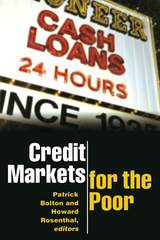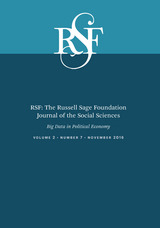2 books about Rosenthal, Howard

Credit Markets for the Poor
Patrick Bolton
Russell Sage Foundation, 2005
Access to credit is an important means of providing people with the opportunity to make a better life for themselves. Loans are essential for most people who want to purchase a home, start a business, pay for college, or weather a spell of unemployment. Yet many people in poor and minority communities—regardless of their creditworthiness—find credit hard to come by, making the climb out of poverty extremely difficult. How dire are the lending markets in these communities and what can be done to improve access to credit for disadvantaged groups? In Credit Markets for the Poor, editors Patrick Bolton and Howard Rosenthal and an expert team of economists, political scientists, and legal and business scholars tackle these questions with shrewd analysis and a wealth of empirical data. Credit Markets for the Poor opens by examining what credit options are available to poor households. Economist John Caskey profiles how weak credit options force many working families into a disastrous cycle of short-term, high interest loans in order to sustain themselves between paychecks. Löic Sadoulet explores the reasons that community lending organizations, which have been so successful in developing countries, have failed in more advanced economies. He argues the obstacles that have inhibited community lending groups in industrialized countries—such as a lack of institutional credibility and the high cost of establishing lending networks—can be overcome if banks facilitate the community lending process and establish a system of repayment insurance. Credit Markets for the Poor also examines how legal institutions affect the ability of the poor to borrow. Daniela Fabbri and Mario Padula argue that well-meaning provisions making it more difficult for lenders to collect on defaulted loans are actually doing a disservice to the poor in credit markets. They find that in areas with lax legal enforcement of debt agreements, credit markets for the poor are underdeveloped because lenders are unwilling to take risks on issuing credit or will do so only at exorbitant interest rates. Timothy Bates looks at programs that facilitate small-business development and finds that they have done little to reduce poverty. He argues that subsidized business creation programs may lure inexperienced households into entrepreneurship in areas where little profitable investment is possible, hence setting them up for failure. With clarity and insightful analysis, Credit Markets for the Poor demonstrates how weak credit markets are impeding the social and economic mobility of the needy. By detailing the many disadvantages that impoverished people face when seeking to borrow, this important new volume highlights a significant national problem and offers solutions for the future.
[more]

RSF
The Russell Sage Foundation Journal of the Social Sciences: Big Data in Political Economy
Howard Rosenthal
Russell Sage Foundation, 2016
Rapid technological advances since the 1980s have revolutionized data gathering and changed the nature of many day-to-day transactions. Today, nearly every economic and financial transaction is recorded and can be linked to the individuals involved. This proliferation of “big data” makes it possible for economists and political scientists to empirically analyze the spending behavior of far greater numbers of individuals and firms, over much longer periods of time, than ever before. In “Big Data in Political Economy,” edited by Atif Mian and Howard Rosenthal, a group of quantitative researchers explore the possibilities and challenges of this data boom for the social sciences, focusing on how big data can help us gain new insights into such issues as social inequality, political polarization, and the influence of money in politics.
Among other topics, the articles in this issue demonstrate how large-scale data sources can be used to analyze campaign contributions and political participation. Adam Bonica outlines the development of a comprehensive “map” of the American political system that collects, processes, and organizes data on politicians’ campaign finances, policy positions, and voting records, and makes such information available to voters. Drew Dimmery and Andrew Peterson show how web-based data-gathering techniques can augment such a map to include political contributions made by nonprofits, which are often overlooked or not fully transparent. Deniz Igan links campaign contribution data to both policymakers’ voting records and financial institutions’ lending behavior and shows that legislators who were heavily lobbied by institutions engaging in risky lending, such as subprime lenders, were more likely to vote for deregulation. Chris Tausanovitch connects big data on voters’ income and policy preferences to the voting records of their congressional representatives in order to study how effectively the political system represents voters of different income levels. And Sharyn O’Halloran and coauthors discuss how big data can augment traditional observational research by replacing tedious hand coding of volumes of text with automated procedures.
As research in political economy increasingly focuses on the role of money in shaping the outcomes of elections and policymaking, new methods of aggregating and examining financial data have become central. Together, the papers in this volume show how big data provides unprecedented opportunities for social scientists to better understand the links between politics and markets.
Among other topics, the articles in this issue demonstrate how large-scale data sources can be used to analyze campaign contributions and political participation. Adam Bonica outlines the development of a comprehensive “map” of the American political system that collects, processes, and organizes data on politicians’ campaign finances, policy positions, and voting records, and makes such information available to voters. Drew Dimmery and Andrew Peterson show how web-based data-gathering techniques can augment such a map to include political contributions made by nonprofits, which are often overlooked or not fully transparent. Deniz Igan links campaign contribution data to both policymakers’ voting records and financial institutions’ lending behavior and shows that legislators who were heavily lobbied by institutions engaging in risky lending, such as subprime lenders, were more likely to vote for deregulation. Chris Tausanovitch connects big data on voters’ income and policy preferences to the voting records of their congressional representatives in order to study how effectively the political system represents voters of different income levels. And Sharyn O’Halloran and coauthors discuss how big data can augment traditional observational research by replacing tedious hand coding of volumes of text with automated procedures.
As research in political economy increasingly focuses on the role of money in shaping the outcomes of elections and policymaking, new methods of aggregating and examining financial data have become central. Together, the papers in this volume show how big data provides unprecedented opportunities for social scientists to better understand the links between politics and markets.
[more]
READERS
Browse our collection.
PUBLISHERS
See BiblioVault's publisher services.
STUDENT SERVICES
Files for college accessibility offices.
UChicago Accessibility Resources
home | accessibility | search | about | contact us
BiblioVault ® 2001 - 2024
The University of Chicago Press









